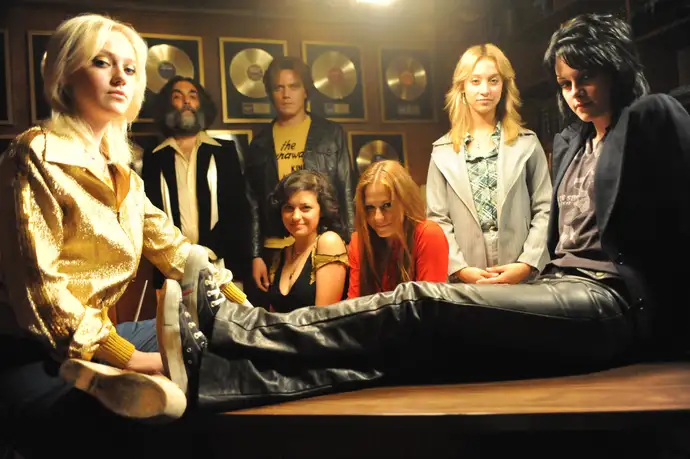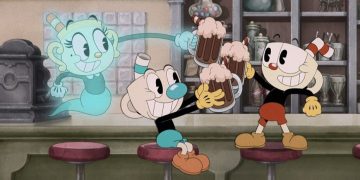We often recommend media and products we like. If you buy anything through links on our site, we may earn a commission.
Behind every great musician is a great (or terrible) manager who calls the shots, books the shows, negotiates the contracts and payrolls. They essentially have complete and utter control over a star’s life, making it easy to take advantage of the talent who trusts in them.
Some music managers are genuinely in it for the art, for the potential they see in someone, for the impact they can have. Other music managers view it as a shortcut to riches, pumping their clients full of drugs, slaving them to work like dogs, and raking in those dollars.
Here are our picks for the best movies about music managers and producers, which explore the dynamics between them and their musicians. Many are based on real people.
Michael Shannon is the perfect guy to play off-beat characters who err on the side of villain. Kim Fowley was a “shadowy cult figure” and self-proclaimed “necessary evil” of the 70s music scene, a sort of punk purist who launched the all-girl rock band The Runaways to fame.
Decked out in eyeliner and choker, Kim coaxes out the bad-girl side of singer Cherie Currie (played by Dakota Fanning) and introduces her to the rest of his makeshift band, who practice in a trailer while Kim screams and throws things at them for “heckling practice.”
While Kim got The Runaways signed to Mercury Records, he also broke them—both as a band and as people. After convincing Cherie to do a secret photoshoot, the girls split up and Cherie spirals into drug addiction.
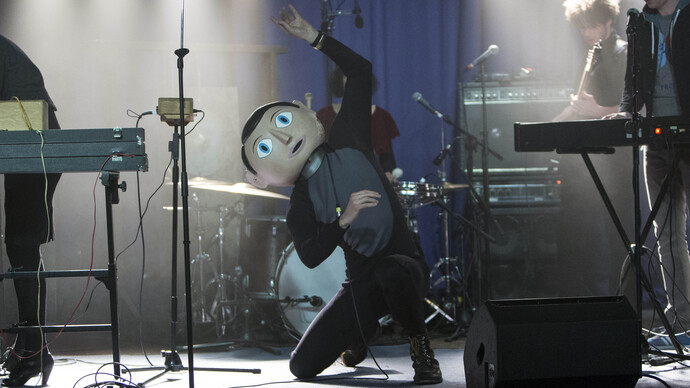
Some indie films try too hard to be zany and original, but for Frank, it comes naturally. Lenny Abrahamson’s black-comedy stars Michael Fassbender as said-guitarist Frank—though you wouldn’t necessarily know it because he spends the whole movie in a giant papier-mâché head.
Don (Scoot McNairy) is the manager of The Soronprfbs, whose keyboardist attempts suicide so Jon (Domhnall Gleeson) is recruited. No, Don isn’t one of the evil, bloodsucking manager types, but he does fail to pay the bands rent and live up to Frank’s expertise. Then, he kills himself. This isn’t such a big spoiler, as it happens halfway through the movie, but his presence still lingers on throughout Frank.
After finding out Don was the original keyboardist, we wonders if there’s a kind of keyboard-curse on the band, and whether Jon’s next. After cremating Don, the band stop in Texas to scatter his ashes, but his absence causes the gang to crumble, and the nature of Frank’s mask is put under the spotlight.
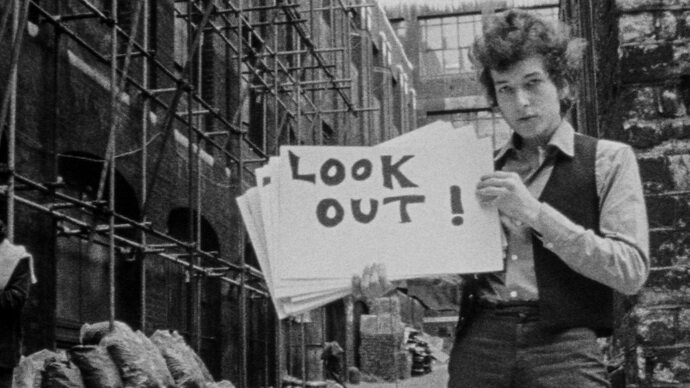
Dubbed the “pre-eminent chronicler of Sixties counterculture” by The Independent, D. A. Pennebaker captured the likes of Otis Redding, Jimi Hendrix, Little Richard, and Chuck Berry with his films.
Known for his many documentaries—music-related and otherwise—Pennebaker spent particular time featuring Bob Dylan in three of them. The most acclaimed of the three is Don’t Look Back, a black-and-white documentary that’s preserved in the US National Film Registry.
Voted as the ninth-best documentary ever made, Don’t Look Back lets us tag along on the day-to-day life of a legendary country singer during the 60s. The film’s opening title cards to “Subterranean Homesick Blues” have been particularly praised and parodied.
When on the road with Bob Dylan, we also spend a lot of time with his manager, Albert Grossman. Pennebaker loved direct cinema (hand-held and real-time), so we witness all the backstage action from a neutral POV.
And yet, despite a knack for expensive record deals, Dylan ended up firing Grossman in 1971 for getting greedy.
5. Amy (2015)

The relationship between Amy Winehouse and her manager is a little complex because… well… he was her dad. Much like the famously vile manager of The Jackson Five, Mitch Winehouse put his daughter’s career before her own health and happiness.
You know that line about her not going to rehab because “my daddy thinks I’m fine”? That’s based on a true story. She finally agreed to attend rehab if her father approved, which he didn’t (presumably because it would cost him many tour dates and a lot of money).
Amy Winehouse died of alcohol poisoning five years later, exacerbated by many years of hard drug abuse.
Asif Kapadia takes us through the whole of the jazz singer’s life, from childhood to death at just 27 years old. It includes a jab at Mitch, who allowed her self-destruction to continue in the name of success.
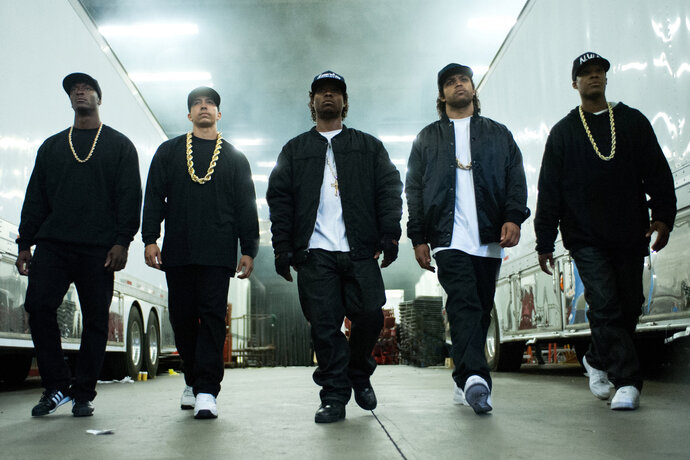
Straight Outta Compton doesn’t look like your typical Oscar-nominated film from its cover, but we assure you it’s worthy of it. Director F. Gary Gray’s observational biopic was commended for being one of the more realistic of the genre, tracing the rise and fall of N.W.A.
Straight Outta Compton is as much a tale of gang culture as it is the music industry, with the hip-hop group painted in an ugly-but-honest picture of life on the streets of Los Angeles.
Their rap lyrics were enough to spark controversy back in the 90s, which manager Jerry Heller (played by Paul Giamatti) tried to keep under control. Don’t feel too sorry for him, though; the sleazy businessman had been underpaying them all along while embezzling funds.
Former N.W.A members Ice Cube and Dr. Dre produced Straight Outta Compton, giving it that uniquely raw authenticity.
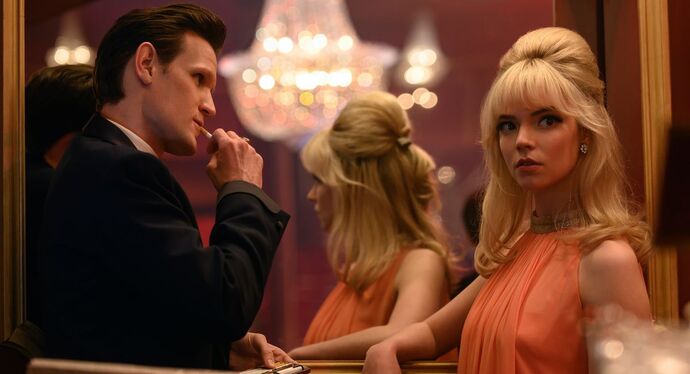
Last Night in Soho features your typical corrupt manager archetype, but it doesn’t start out that way. Directed by Edgar Wright, Last Night in Soho unfolds in London where young Ellie (played by Thomasin McKenzie) moves to study fashion.
Ellie has a hard time fitting in because of her love of the 60s. The era is her escape route, and it manifests itself as reality when she travels back in time to the 1960s when she sleeps. It’s not just a dream, as shown when she wakes up with real love bites on her neck.
When she’s time-travel-dreaming, Ellie finds herself in the body of Sandie (played by Anya Taylor-Joy), an aspiring singer of the era. Her relationship with her manager as both lover and client quickly spirals into darkness when he turns out to be a manipulative pimp.
When these dreams-turned-nightmares seep into Ellie’s waking life, she starts to wonder if Jack was a real guy… and what he did to her.
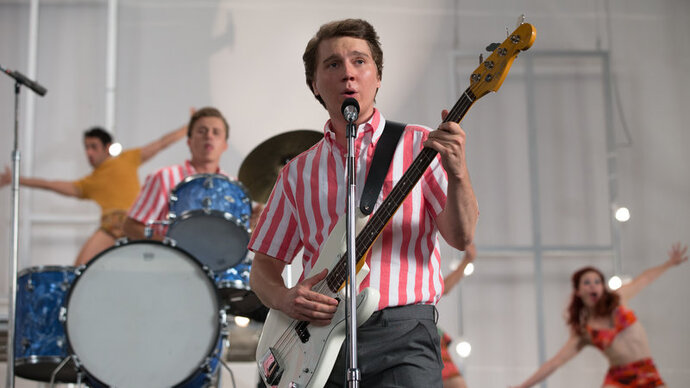
Straight Outta Compton slightly paled in comparison to Love & Mercy, which came out not too long before it and also featured Paul Giamatti playing a crooked manager.
Well, technically, Dr. Eugene Landy was a psychologist, but he managed Brian Wilson’s life with a tightly controlled 24-hour therapy regime.
Why was this doctor so dedicated to “looking after” Brian, lead singer of the Beach Boys who suffered with paranoid schizophrenia? Landy wants to force music out of Brian—despite being retired—while high as a kite, and even weasels himself into the musician’s will.
Bill Pohlad directs this tragic biopic, switching between Brian’s life in the 60s (played by Paul Dano) and 80s (played by John Cusack).
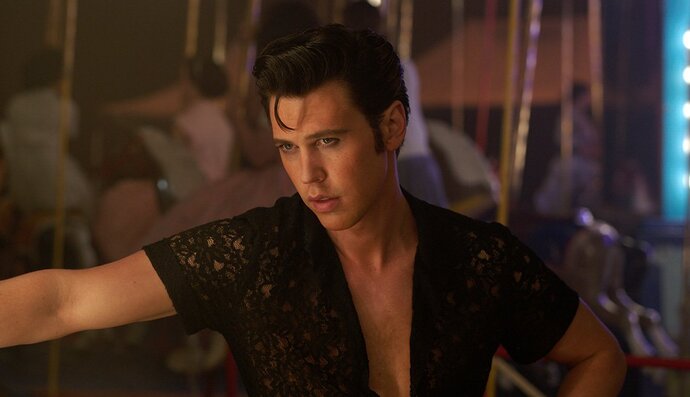
Our favorite movie about music managers also happens to be the newest one of the list, which showcases the glamour of Elvis Presley at a breakneck speed that’s best experienced in theaters.
The fact that Elvis is directed by Baz Luhrmann should tell you everything you need to know about the film’s spectacle!
We’re used to seeing Tom Hanks play the good guy, but this time he’s the Dutch-born music manager Colonel Tom Parker, who’s often blamed for Elvis Presley’s early death. Nicknamed “The Snowman,” Parker began his career in carnival, hence his attraction to Elvis’s showmanship.
Parker gained the poor musician’s trust and worked him to the bone. He fed Elvis drugs to keep him reliant and tricked him into signing a permanent Las Vegas residency contract that ended his life.
Despite being called Elvis, and despite being the only Elvis-centric biopic out there, the protagonist is arguably Parker, who opens the film on his deathbed, claiming he didn’t destroy Elvis but instead “made” him.
Source by whatnerd.com






















